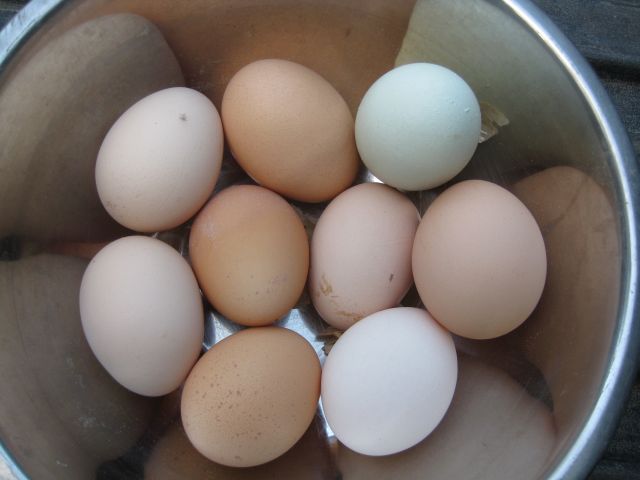I have mentioned my travails with the Speckled Sussex – one was ill and died and the other went into a serious slump and, despite my efforts also died. So from 13 hens and 1 rooster I am down to 11 hens and a rooster. Two of the hens had problems of sorts.
Gimpy, one of the hybrids inherited from my neighbor, developed a bad leg or hip. Don’t know why – could this has been from the rough attentions of the rooster? She hobbles with difficulty and I recently noticed she was now losing feathers on her back. Thinking this was caused by insects (lice, mites, fleas) I began dusting her with diatomaceous earth. I then ratcheted up the treatment and began dusting her with Sevin dust powder (deviating from organic principles here). Then she wouldn’t come out of the coop during the day and I thought this was because the weather was cold and she did not have all her feathers to keep her warm. But I noticed she wasn’t wandering around the coop but huddling in a corner under the nest boxes, so it occurred to me that some of the feather loss was because of feather-pecking by the other birds and she was sheltering defensively. One warmer morning, I dusted her with Sevin and, despite her protests, took her outside and placed her amongst the others. I noticed that two of the birds approached her as she balanced on a log on one foot (she tries not to use her damaged foot unless she has to) and pecked at her back. And got a bite of Sevin powder and backed off in disgust. Maybe this helped. I am pleased that she is now, of her own accord, coming out of the coop during the day.
My other patient is one of the Golden Comets whom I have named “Goldie” – a spur of the moment naming decision required when I took her to the vet. Her problem was her large crop, which was always large, and her unusual neck movements as she tried to get the food down and to stay in her crop. The vet realized I like to be hands on and was very helpful showing me how to insert a tube to try drain the crop contents. He also prescribed Nystatin for crop fungal infection and gave me a couple of tubes for administering the medicine and draining the crop, if I wished. Well, Goldie seems to be getting better, as well. After scouring the internet for advice and noticing what appeared to be conflicting suggestions, I decided to administer every few days, via a feeding tube, a capsule of psyllium fiber (Metamucil) mixed with 25ml of water and then massage the crop. And it seems to be helping.
I should mention that, unlike the now departed pair of Speckled Sussex which appeared devoted to each other and always stayed together, the other Golden Comet (Goldie’s sister as it were) appears little interested in Goldie and when I remove Goldie from circulation and then reintroduce her, the other Golden Comet pays scant attention. This other Golden Comet is also amongst the most intelligent of the birds, the first to run up to me on the off chance I am bearing food and, when I am digging trenches or turning the dirt, she is constantly at my side pecking at the worms in the upturned soil as soon as they appear. I am not suggesting intelligence trumps emotion, just that she appears to have reordered her priorities.
So it is spring now and everything is looking up, and the chicken appear happy and content and I am getting between 7 and 9 eggs a day – different sizes and colors.

